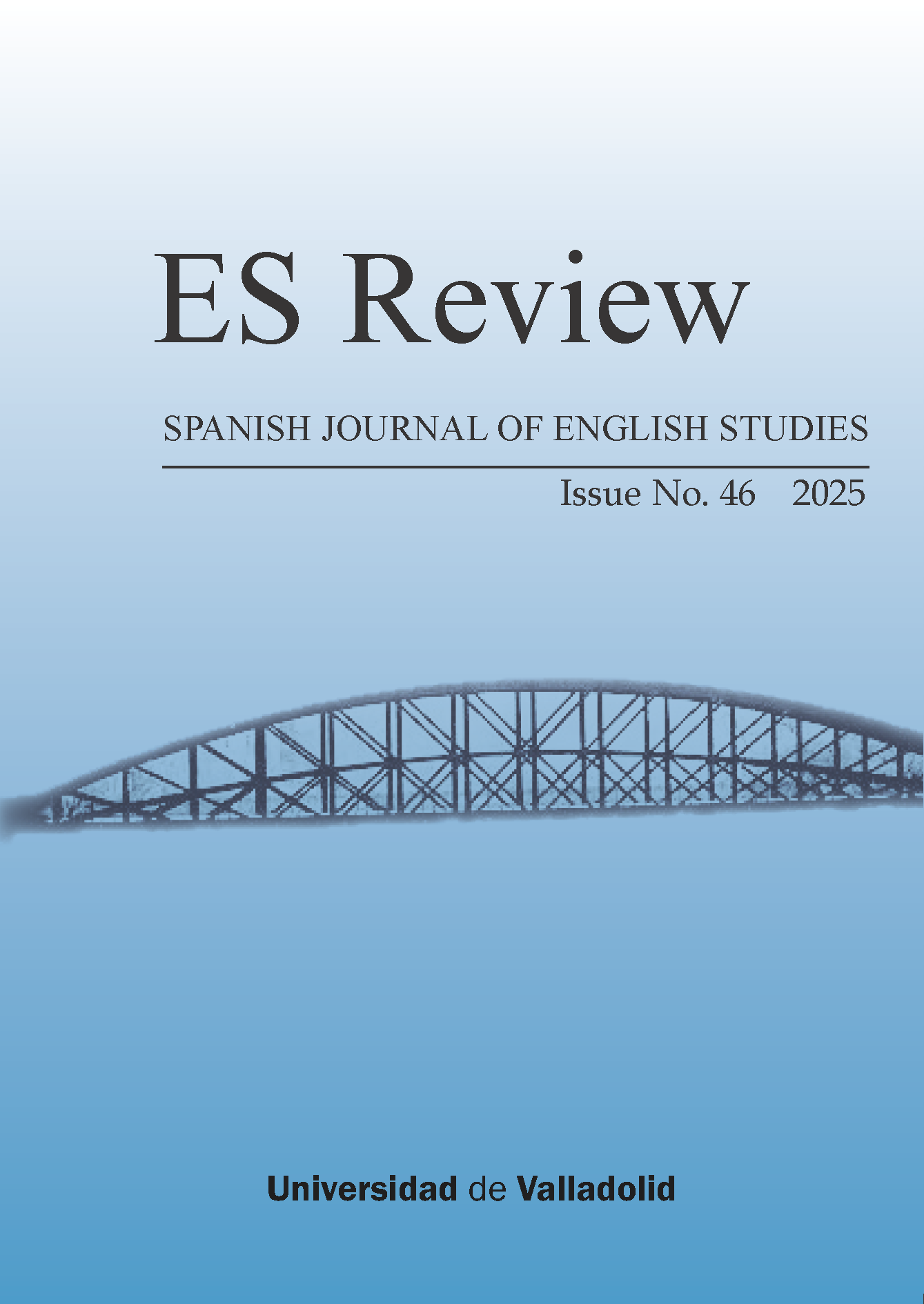Mourning for the Lost Nation: The Transformative Poetics of Derek Jarman’s The Last of England and Terence Davies’ Of Time and The City.
DOI:
https://doi.org/10.24197/0n1bee98Keywords:
Nostalgia, Film, Politics, National Identity, Poety, EnglandAbstract
The mourning for the decay of England’s glory has become a constant presence in postmodern English culture. There is an ever-present feeling of nostalgia for the dissolution of the past, while, simultaneously, the future is being cancelled. Both Derek Jarman and Terence Davies transformed films into poetic devices where the emotion was to be poured out, reflected upon, and revitalized. This article aims to study how the authors’ poetics are articulated, aiming to analyze the intersections between poetry, film, politics, and national identity. To achieve that, the poetic resources and strategies are to be interpreted in relation to the political situation, as both authors establish connections between individual emotions on a micro-personal level and the broader political and collective panorama. Jarman and Davies were adept at crafting a nostalgic epistemology from poetics that allowed them to acknowledge the current state of bleakness while also constructing a new identity for the nation.
Downloads
References
Álvarez, Iván Villarmea. “Urban Self-Portraits and Places of Memory: The Case of Terence Davies’ Of Time and The City.” Cityscapes: World Cities and Their Cultural Industries, Common Ground Publishing, 2014, pp. 40–53.
Balboni, Francesca. "Burning Through: Derek Jarman’s Realism in The Last of England (1987)." Oxford Art Journal, vol. 42, no. 2, 2019, pp. 217–31, doi: 10.1093/oxartj/kcz003.
Bifo-Berardi, Franco. After the Future. AK Press, 2011.
Belgley, Jon. “The Literature of the Falklands/Malvinas War.” Edinburgh Companion to Twentieth-Century British and American War Literature, edited by Adam Piette and Mark Rawlinson, Edinburgh University Press, 2012, pp. 231–40.
Brydon, Lavinia. “The Nostalgic Gardens of Derek Jarman’s England.” Dandelion: Postgraduate Arts Journal and Research Network, vol. 4, no. 2, 2013, pp. 1–15, doi: 10.16995/ddl.288.
Conan Doyle, Arthur. The Sign of the Four. Oxford UP, 2014.
Davies, Terence. Of Time and The City. Hurricane Films, 2008.
Dillon, Steven. Derek Jarman and Lyric Film: The Mirror and the Sea. University of Texas Press, 2004.
Ellis, Jim. Derek Jarman's Angelic Conversations. University of Minnesota Press, 2009.
Everett, Wendy. "Remembering the Future: Terence Davies and the Paradoxes of Time." Film Studies, vol. 9, no.1, 2006, pp. 29–39, doi: 10.7227/FS.9.6.
Fisher, Mark. Ghosts of My Life: Writings on Depression, Hauntology and Lost Futures. John Hunt Publishing, 2014.
Higson, Andrew. “Nostalgia is not What It Used to Be: Heritage Films, Nostalgia Websites and Contemporary Consumers.” Consumption Markets & Culture, vol. 17, no. 2, 2014, pp. 120–42, doi: 10.1080/10253866.2013.776305.
Holba, Anette. “In Defense of Leisure.” Communication Quarterly, vol. 62, no. 2, 2014, pp. 179–92, doi: 10.1080/01463373.2014.890117.
Housman, Alfred Edward. A Shropshire Lad. Project Gutenberg, 2020. www.gutenberg.org/cache/epub/5720/pg5720-images.html/.
Humphrey, Daniel. "Authorship, History and the Dialectic of Trauma: Derek Jarman's The Last of England." Screen, vol. 44, no. 22, 2014, pp. 208–15, doi: 10.1093/screen/44.2.208.
Jarman, Derek. The Last of England. Anglo International Films, British Screen Productions, Film4 Productions, Tartan Films, ZDF, 1987.
Jarman, Derek, Kicking the Pricks. Overlook, 1998.
Jessop, Bob. “Margaret Thatcher and Thatcherism: Dead but not Buried.” British Politics, vol. 10, no. 1, 2015, pp. 16–30, doi: 10.1057/bp.2014.22.
Kelman, Ken. “Film as Poetry.” Film Culture, no. 29, 1963, 22–27.
Koresky, Michael. Terence Davies. University of Illinois Press, 2014.
Miller, Elaine P. “Harnessing Dionysos: Nietzsche on Rhythm, Time, and Restraint.” Journal of Nietzsche Studies, vol. 17, 1999, pp.1–32, www.jstor.org/stable/20717702/.
Monk, Claire. “The British ‘Heritage Film’ and its Critics.” Critical Survey, vol. 7, no. 2, 1995, pp. 116–24, www.jstor.org/stable/41555905/.
Nairn, Tom. The Enchanted Glass: Britain and Its Monarchy. Verso Books, 2011.
Niven, Alex. New Model Island: How to Build a Radical Culture Beyond the Idea of England. Watkins Media Limited, 2019.
Oliver, Elisa, and Jonathan Whitehall. "The Past Dreams the Future Present’: Dream as Political Visual Historiography in the work of Artist and Film Maker Derek Jarman." IDEA–Interdisciplinary Discourses, Education and Analysis, no. 2, 2022, pp. 72–88, e-space.mmu.ac.uk/630671/1/EOJW-JarmanDreamsfinal.pdf/.
Orr, John. "The Art of National Identity: Peter Greenaway and Derek Jarman." British Cinema, Past and Present, edited by Justine Ashby and Andrew Higson, Routledge, 2013, pp. 327–38.
Roberts, Les. "Of Time, Dissonance and the Symphonic-Poetic City." Eselsohren: Journal of the History of Art, Architecture and Urbanism, vol 2, no. 1–2, 2014, pp. 89–104, livrepository.liverpool.ac.uk/3029831/1/Roberts_Of_Time_Dissonance_%26theCity_2015.pdf/.
Verrone, William. Adaptation and the Avant-garde. A&C Black, 2011.
Downloads
Published
Issue
Section
License
Copyright (c) 2025 Diana Ortega Martín

This work is licensed under a Creative Commons Attribution 4.0 International License.
Authors retain publishing rights and grant ES Review. Spanish Journal of English Studies right of first publication.
Simultaneously, all articles and reviews published in ES Review until nº 43 are available under a Creative Commons Attribution-NonCommercial 4.0 International License (CC BY-NC 4.0) while those published from nº 44 onwards will be available under a Creative Commons Attribution 4.0 International License (CC BY 4.0), by which others are allowed to share and use their work with an acknowledgement of the work’s authorship and initial publication in this journal.
In addition, ES Review allows authors to arrange additional contracts for the non-exclusive publication of the journal’s published version of the work (e.g., in a book), with an acknowledgement of its initial publication in this journal. In such a case, authors are required to approach the editor(s)/publisher to request permission.


